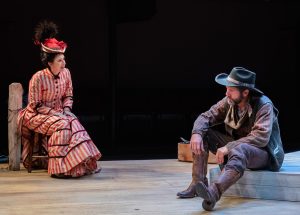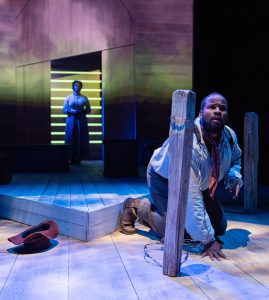Awe-inspiring Historical Drama
An exceptional production in every way, Last Drive to Dodge, opened last weekend at Taproot’s Jewel Mainstage, directed by the venerable Valerie Curtis-Newton. It was extraordinary in every way, the script by Andrew Lee Creech, the superb acting, the lovely accompanying music, the evocative lighting effects and the history lessons gently woven into the plot. As a joint production of the Hansberry Project and Taproot it was a tribute to a marvelous partnership.

Set in 1884, that is to say about 20 years after the Civil War, on a ranch in Texas, Last Drive to Dodge, takes place when great changes, such as the railroads, barbed wire and corporate big money are changing the traditional West. It deals with the rather untidy effects of Reconstruction, when former enslaved Blacks were not really free anywhere but particularly in the South, and when poor white veterans of the Civil War were not exactly having an easy time; having fought a war for the more privileged.
Driving the plot is the pursuit and the deterioration of the American Dream, because two sets of people experience it differently. Ro, played by Dedra D. Woods and Prophet, played by Yusef Seevers, are a Black couple, at first deeply romantically in love, but throughout the play, by struggling to reconcile their differences and making respectful compromises develop a mature sustaining relationship. Ro is an indentured servant on the ranch, and Prophet is a skilled cowhand.
One of the conflicts between Ro and Prophet is a conflict existing among a lot of oppressed people. Does one leave to pursue individual success or does one stay and try to help one’s people in the extremely oppressive society. When Prophets attempts to buy land are thwarted by de facto racist rules, he wants to leave. Ro wants to use her clandestinely acquired education to open a school.
The subplot contains the inverse of successfully pursuing the American Dream. Two white people, Bennett Bailey, the ranch owner and his sister, Millie follow a different trajectory. They lack the positive qualities of Ro and Prophet, when external forces affect them adversely, they cannot adjust, emotionally they cannot support each other, and they lack inner resources.
The acting by the entire cast was brilliant; especially Dedra D. Woods as Ro. Her delivery of a long monologue in Act II, when the character stops self-censoring herself as she talks to her former white employer was honest and heart-breaking and got a big round of applause.
Also Tim Gouran the ranch owner, a lonely disabled Civil war veteran, expertly portrayed all the corrupting influences of racism. He was not a particularly sadistic character, but he took advantage of the power differential when it suited him. Jonelle Jordan as Millie, his sister, expressed all the conflicts of a person who thought they had escaped the hard-scrapple life of a farmer to New York high society, only to find herself right back there where she started.
The playwright added authenticity to the script by expertly using the appropriate dialects. When Ro and Prophet speak to each other, they use a very Southern dialect, but when they speak to the White folks, the dialect is more standard. Likewise, Millie, slips in and out of standard English and Texan. All the actors as well as Gin Hammond, the dialect coach, are to be commended for their skill.
The technical aspects of this play served the production well. The sound design by Evan Mosher added a lot to the production; not only the pre-show music but the music throughout the play was very soothing and evoked wide open spaces of Texas.
The lighting design by Brian Engle was spectacularly beautiful throughout the whole play; but particularly in the first scene as it enhanced the swift exposition, and just drew the audience right in.
Director Valerie Curtis-Newton brought everything together, choosing a serious yet entertaining script as well as assembling a great cast and crew.
Last Drive to Dodge, like great novels, had many different levels: social justice, history lessons, relationship issues, plus humor, suspense and drama. Needless to say, I heartily recommend this play, and the accompanying art exhibit in the lobby is about Black Cowboys. It exposes one of the great cover-ups in American History: Not all the cowboys were white ex-cavalry officers displaced by the Civil War; many of the cowboys of the Wild West were black former enslaved people.
Get your tickets now; the show had precisely 4 unoccupied seats on a Tuesday matinée.
Last Drive to Dodge. Taproot Theatre in partnership with The Hansberry Project. Jewell Mainstage Theatre, Taproot Theatre, 204-85th St. Seattle 98103 (Corner Greenwood and 85th). Wed. Thur 7:30 pm. Fri, Sat 8 pm. Matinée Sat 2pm and some weekdays. til Oct 21.
Tickets: https://taproottheatre.org/shows/2023/last-drive-to-dodge/




















